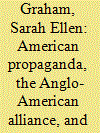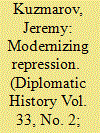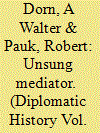|
|
|
Sort Order |
|
|
|
Items / Page
|
|
|
|
|
|
|
| Srl | Item |
| 1 |
ID:
089216


|
|
|
|
|
| Publication |
2009.
|
| Summary/Abstract |
While highly sensitive to embarrassment by us, the British exhibit a distressing lack of sympathy for the discomfiture to which we are exposed because of our association with them.1
Being for the most part abysmally ignorant, [Americans] are convinced that, as a result of the British Empire being kept together, the toilers of overseas are burdened with taxes for the benefit of the degenerate dukes in the metropolis.2
The close diplomatic relationship between Britain and the United States during the Second World War continues to inspire historical interest, much of it coalescing around the mixture of cooperation and discord that underscored the relationship. The received historical view is that the most significant disagreement between the Atlantic powers was the future of the colonial order in general and the status of the British Empire most especially. Washington and London's fundamental antagonism over the principles of postwar trusteeship and self-determination emerges virtually as a historiographical truism, evidenced by the florid and deeply divergent rhetorical positions taken by U.S. President Franklin D. Roosevelt and British Prime Minister Winston Churchill themselves.3 Turning to America's relationship with the objects of decolonization, however, it is evident that in many cases the U.S. commitment to freedom for oppressed peoples did not live up to the ideals espoused. From this angle, the Anglo-American disagreement over colonialism opens broader questions about the sources of U.S. foreign policy itself and the political constraints of its implementation. Did American strategic imperatives outweigh ideals that were genuinely held in the case of colonial self-determination? Was the rhetoric of decolonization purely instrumental? Or, as Michael H. Hunt has contended, was the "ideology" of U.S. foreign policy multifaceted, incorporating notions of racial hierarchy and an antipathy to revolutionary change as well as the much-valorized commitment to freedom, such that decision makers were at key moments highly amenable to the colonial status quo?
|
|
|
|
|
|
|
|
|
|
|
|
|
|
|
|
| 2 |
ID:
089219


|
|
|
|
|
| Publication |
2009.
|
| Summary/Abstract |
Scholarly work on the rapprochement between the People's Republic of China (PRC) and the United States that began in the early 1970s has mainly focused on the strategic and security concerns that underlay that development.1 Yet, during the early phases of the new relationship political-economic problems, involving claims for expropriated property and commercial policy matters, had a telling impact on U.S. policymaking and Sino-American relations. Believing that the development of trade between the United States and China could be a significant element of the rapprochement, the Nixon administration assumed that commercial prospects depended on resolving thorny difficulties from the years of overt hostility, mainly the PRC assets blocked by the U.S. Treasury and U.S. private claims over property seized by the PRC. During early 1973, U.S. and PRC diplomats began talks over ways and means to settle those problems. Yet, neither the Nixon nor the Ford administrations could reach a claims-assets settlement with Beijing; what became contentious negotiations deadlocked until after the Carter administration came to power.
|
|
|
|
|
|
|
|
|
|
|
|
|
|
|
|
| 3 |
ID:
089218


|
|
|
|
|
| Publication |
2009.
|
| Summary/Abstract |
In late 1960, the Smithsonian Institution in Washington, DC, opened "The Art and Archeology of Viet Nam," an exhibit featuring an impressive collection of Vietnamese relics and contemporary handicrafts. Patrons entering the exhibit were greeted by the soft sounds of Vietnamese music and the scent of burning incense. The centerpiece of the room was a large and intricately carved "National Ancestral Altar" dedicated to Vietnam's "rulers, ministers, generals, scholars, and heroes.
|
|
|
|
|
|
|
|
|
|
|
|
|
|
|
|
| 4 |
ID:
089214


|
|
|
|
|
| Publication |
2009.
|
| Summary/Abstract |
The premise of my presidential address, and now this published version of the talk, is that domestic partisan, the struggle for power at home, has played, and no doubt continues to play, a substantial role in the making and direction of American foreign policy.
|
|
|
|
|
|
|
|
|
|
|
|
|
|
|
|
| 5 |
ID:
089215


|
|
|
|
|
| Publication |
2009.
|
| Summary/Abstract |
During the 2004 presidential election campaign, Vice President Richard Cheney called for the Salvador option in Iraq, implying the training of local paramilitary and police forces to pacify the insurgency and restore public order.
|
|
|
|
|
|
|
|
|
|
|
|
|
|
|
|
| 6 |
ID:
089217


|
|
|
|
|
| Publication |
2009.
|
| Summary/Abstract |
On October 16, 1962, President Kennedy learned that the Soviet Union was building nuclear missile installations in Cuba. For the next six days the president and his advisers secretly deliberated about the American response. The new threat not only upset the nuclear balance but also placed nuclear missiles capable of destroying most U.S. cities on the territory of a new enemy, Premier Fidel Castro. As the Kennedy administration strove to keep this alarming news secret, it nevertheless shared it with the new acting secretary general of the United Nations, a quiet unassuming Burmese diplomat named U Thant.2 Specifically, on Saturday, October 20, 1962, Admiral John McCain, military adviser at the U.S. Mission to the United Nations, informed Thant's military adviser, Major General Indar Jit Rikhye, about the missiles.3 General Rikhye went to the Pentagon for a secret briefing and received an album of U.S. photos of the menacing missiles,4 which he showed to Thant. Two days later, on Monday, October 22, Rikhye informed Thant that Kennedy would be making an important television broadcast that evening concerning the missiles. Thant conferred with the U.S. ambassador to the United Nations, Adlai Stevenson,5 and a few hours later watched Kennedy make one of the most momentous presidential speeches of the century. The president announced a "naval quarantine" of Cuba, pushing the world closer to nuclear war than ever before. In the deepening crisis, the United Nations, and specifically Secretary General Thant, was to play a significant role in de-escalating and then resolving the nuclear standoff between the superpowers. Thant (Figure 1) sent appeals and messages, relayed proposals, offered reassurances, advanced the "noninvasion for missiles" formula that formed the basis of the final agreement, shuttled to Cuba to mollify Castro, and helped secure a verification arrangement.
|
|
|
|
|
|
|
|
|
|
|
|
|
|
|
|
|
|
|
|
|